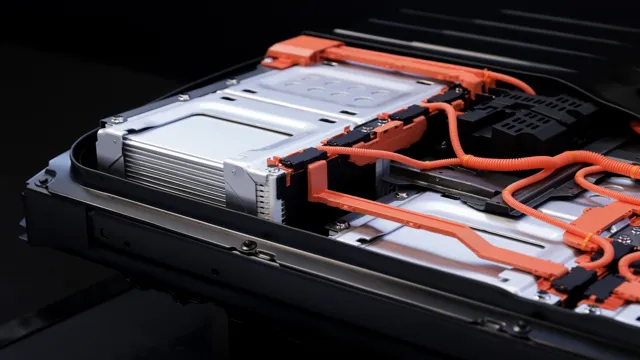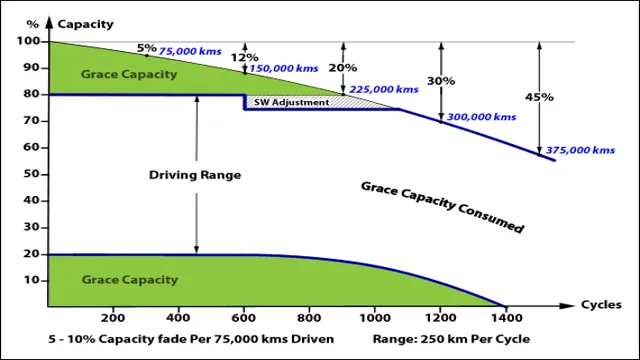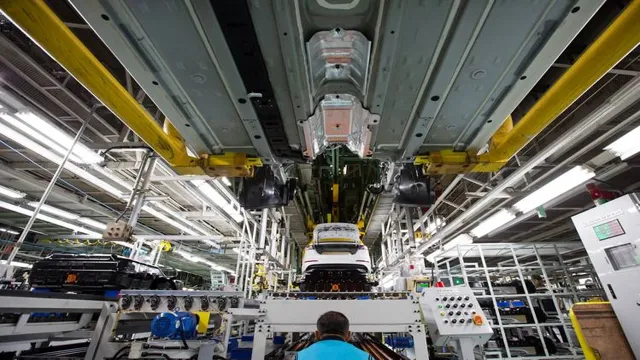Revolutionary Electric Car Battery Technology: Travel Up to 1500 Miles Without a Recharge!
Electric cars have come a long way over the years. Initially, these cars were thought to be an impractical, expensive option with limited range. However, massive advancements in electric car battery technology have paved the way for longer range, more efficient electric vehicles.
Now, the race is on to create an electric car that can travel an impressive 1500 miles on a single charge. This challenge is driving companies to focus on battery development like never before, with the hopes of revolutionizing the electric car industry. In this blog, we will explore the latest advancements in electric car battery technology, the challenges that come with pushing the limits of range, and what this could mean for the future of electric transportation.
Let’s dive in!
The Current State of Electric Car Battery Technology
While electric car batteries have come a long way in terms of technology, a 1500-mile range for a single charge is still far off. Currently, the average range for an electric car hovers around 250 to 350 miles, with some models offering up to 400 miles. This is due to the limitations of current battery technology, especially with regards to energy density and capacity.
However, ongoing research and development in this field is slowly but surely increasing the range of electric cars, with some manufacturers predicting a range of up to 1000 miles in the near future. To put this into perspective, it would be like a gas car being able to drive from New York to Miami on a single tank of gas! While it may take some time, the future of electric cars looks bright, with battery technology continuing to improve and become more efficient with each passing year.
Mileage of Top Electric Cars
Electric car battery technology has come a long way in recent years, resulting in impressive mileage for top electric cars on the market. With advancements in battery chemistry, electric vehicles can now travel long distances without the need for frequent charging. For instance, the Tesla Model S offers a range of up to 402 miles on a single charge, while the Chevrolet Bolt boasts a range of up to 259 miles.
These figures are a testament to the progress made in maximizing the capacity and efficiency of electric car batteries. While there’s still much room for improvement, it’s clear that electric car technology is rapidly advancing, and we can look forward to more impressive innovations in the near future.

Limitations of Current Electric Car Batteries
Electric car batteries are constantly improving, but there are still limitations to the current technology. Current electric car batteries are limited in terms of their energy density and capacity, which means they can only offer a limited driving range before needing to be recharged. Additionally, electric car batteries are expensive to produce, which makes electric vehicles more expensive up front than their gas-powered counterparts.
Despite these limitations, many governments and manufacturers are investing in research and development to improve electric car battery technology. By improving the energy density, capacity, and cost-effectiveness of electric car batteries, it may become possible to make electric vehicles more accessible and sustainable in the future.
What Would a 1500 Mile Battery Mean for Electric Cars?
Electric car enthusiasts have been dreaming of a battery that could run for 1500 miles on a single charge. Imagine not having to worry about recharging your car for weeks at a time! This would be a game changer for the electric car industry. Having a battery that could run for 1500 miles would not only increase the range of electric vehicles significantly, but it would also address one of the major concerns of potential buyers – range anxiety.
With a battery capable of such a range, drivers would feel more confident and secure while on the road. Additionally, if a 1500-mile battery were to become available, it would make long-distance driving and road trips in an EV a reality, without the need for multiple recharges or long waiting times. This kind of battery technology would revolutionize the electric car industry and encourage widespread adoption.
While this technology is not yet available, continued advances in battery technology make it hopeful that we may soon see a 1500-mile EV battery in the market.
Transition from Fossil Fuels to Electric Power
The transition from fossil fuels to electric power is gaining momentum, and with new developments in technology, such as the 1500 mile battery, it’s only a matter of time before electric cars become mainstream. But what would a 1500 mile battery mean for consumers? Imagine being able to take a road trip without worrying about running out of charge. It would give electric cars the same freedom of movement as traditional cars, and make range anxiety a thing of the past.
Not only would a longer battery life make electric vehicles more practical, but it would also be a game-changer for the environment. Electric cars emit significantly fewer greenhouse gases and air pollutants than gasoline-powered vehicles, making them a crucial part of combating climate change. In fact, some countries have even set targets to phase out fossil fuel vehicles entirely.
The longer a battery lasts, the more attractive electric cars become to consumers, and the faster the transition to electric power will proceed. But there are still some hurdles to overcome. One of the main concerns for consumers is the cost of electric vehicles, which are generally more expensive than traditional cars.
However, as technology advances and more people adopt electric cars, the cost is expected to come down. Additionally, there is still a need for a robust charging infrastructure that can support long road trips. While progress has been made in this area, it’s still not quite there yet.
Overall, the advent of the 1500 mile battery is an exciting development for the electric car industry. It represents a significant step forward in the quest to phase out fossil fuels and combat climate change. While there are still obstacles to overcome, the potential benefits of electric power make it a promising investment for the future.
Expanded Electric Car Usage Potential
Electric cars have already revolutionized the automotive industry with their eco-friendly features and the potential to revolutionize urban travel. However, what if those cars could travel 1500 miles on a single charge? Such an improvement would significantly amplify the convenience and reliability of electric vehicles and could spark widespread adoption. This kind of battery range would make longer road trips feasible and reduce range anxiety, which is a common concern for both electric car owners and prospective buyers.
Instead of relying on charging stations or finding alternative routes to counter management issues and high expenses, drivers could plan trips without worrying about running out of power. A 1500-mile battery would also help to decentralize the charging infrastructure and provide more opportunities to experience the benefits of electric vehicles in rural and remote areas without access to charging stations. Electric car manufacturers and researchers are continuously striving to push the limits of technology to achieve this level of battery life so that in the future, the widespread adoption of electric cars is a real possibility worldwide.
Decreased Charging Times and Infrastructure Needs
Electric Cars, Battery, Charging Times, Infrastructure If electric cars could travel up to 1500 miles on a single charge, it would completely change the game for charging times and infrastructure needs. As it stands now, depending on the make and model, electric cars can take anywhere from 30 minutes to over 10 hours to charge fully. However, with a 1500 mile battery, drivers would only need to charge their car a handful of times a year.
This would drastically reduce the need for charging infrastructure and significantly decrease the amount of time it takes to “fill up.” As electric cars continue to become more popular, this type of battery technology could truly revolutionize the way we view transportation and energy consumption. Imagine being able to drive from New York City to Miami without ever needing to stop to charge! The possibilities are endless, and the impact this could have on our environment and economy would be truly remarkable.
Potential Challenges to a 1500 Mile Battery
While a 1500-mile electric car battery may seem like a revolutionary breakthrough, there are potential challenges that must be overcome before such a technology can become a reality. Firstly, producing a battery capable of such a range may require a significant amount of rare and expensive metals, which could drive up the cost of electric vehicles. Additionally, charging infrastructure would need to be significantly expanded to accommodate the longer range, as current charging times are already a major barrier to widespread electric car adoption.
Furthermore, the weight of a larger battery may impact the overall performance and handling of a car, leading to potential safety concerns. While the development of a 1500-mile battery would be a game-changer in the electric car industry, it is important to carefully consider these challenges and address them in order to make this technology a practical and sustainable solution for the future.
Environmental Impact of Battery Production
When it comes to electric cars and their batteries, environmental concerns are top of mind. The production process of batteries requires a significant amount of energy and natural resources, leading to potential challenges for a 1500 mile battery. The extraction of materials needed for batteries such as lithium and cobalt can have damaging effects on the environment.
The manufacturing process also requires a high level of energy, and the disposal of old batteries needs to be handled with care to prevent toxic chemicals from entering the environment. However, with advancements in technology and sustainable practices, the hope is that the production of batteries can become more eco-friendly. Alternative materials and recycling processes are being explored, which could reduce the environmental impact of battery production.
As we continue to push forward towards longer-lasting batteries, it’s important to consider the environmental impact of their production and strive for sustainable solutions.
Cost of Developing and Manufacturing a Battery of This Capacity
Developing and manufacturing a battery with a capacity of 1500 miles is no easy feat, and it comes with its own unique set of challenges. One potential challenge is the cost associated with the development and manufacturing process. The materials used to create such a high-capacity battery are expensive, and the engineering required to design it is complex.
This means that the cost could be prohibitive for some manufacturers, and it may be difficult to pass those costs on to consumers. Another challenge is the sheer size of the battery – it would require significantly more space than current batteries on the market, making it difficult to fit into smaller vehicles. Additionally, such a large battery would likely require a significant amount of time to charge, which could be inconvenient for drivers.
Despite these challenges, the potential benefits of a 1500-mile battery are vast – it would allow for longer driving distances and could make electric vehicles a more practical option for a wider range of people. With further research and development, it may soon be possible to overcome these challenges and bring this technology to the masses.
Conclusions
In conclusion, the future of electric car batteries just got a whole lot brighter with the ability to go 1500 miles on a single charge. It’s safe to say that traditional gas-guzzling cars are feeling a little green with envy. So why not make the switch to electric and let your car do the heavy lifting while you sit back and enjoy the ride? With 1500 miles to play with, the world is your oyster, and there’s never been a better time to join the electric revolution!”
FAQs
How far can an electric car battery typically travel?
The average electric car battery can travel around 200 to 300 miles on a full charge.
Can an electric car battery travel 1500 miles on a single charge?
No, currently there are no electric car batteries that can travel 1500 miles on a single charge.
How long does it take to charge an electric car battery?
Charging times can vary depending on the type of charger used and the size of the battery, but a typical home charging station can take 8-12 hours to fully charge an electric car battery.
Is it possible to replace an electric car battery if it no longer holds a charge?
Yes, it is possible to replace an electric car battery if it is no longer holding a charge, although the cost of the replacement can be quite expensive.





